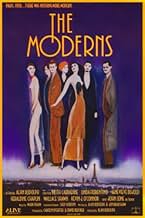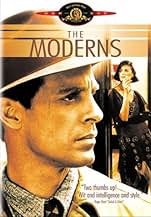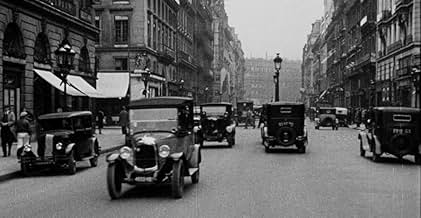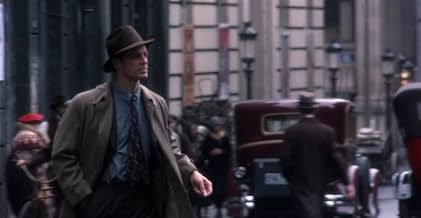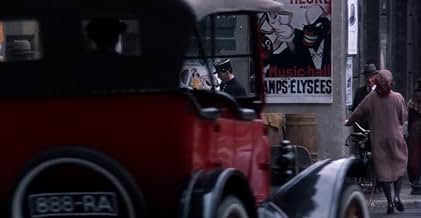ÉVALUATION IMDb
6,6/10
2,2 k
MA NOTE
Ajouter une intrigue dans votre langueA struggling artist is hired to forge paintings, causing him to cross paths with his ex-wife and her powerful new husband.A struggling artist is hired to forge paintings, causing him to cross paths with his ex-wife and her powerful new husband.A struggling artist is hired to forge paintings, causing him to cross paths with his ex-wife and her powerful new husband.
- Director
- Writers
- Stars
- Prix
- 2 victoires et 5 nominations au total
Geneviève Bujold
- Libby Valentin
- (as Genevieve Bujold)
Charlélie Couture
- L'Evidence
- (as Charlelie Couture)
Véronique Bellegarde
- Laurette
- (as Veronique Bellegarde)
Avis en vedette
*****SPOILER ALERT!!!*****
Alan Rudolph's "The Moderns" is a wonderful, funny and twisted film set in 1920's Paris, France. The front burner story is a triangle between Nick, his runaway wife and a cold as ice businessman that wants to obtain a higher social status. Nick(Keith Carradine)and Rachel(Linda Fiorentino)were married years ago and she bails out of the marriage. Years later, she shows up on the arms of Bertram Stone (John Lone). While he deals with her reappearance, he is also talked into making art forgeries by a rather shady behaving gallery owner, Valentin(Genevieve Bujold), as a favor for the wealthy Nathalie De Ville(Geraldine Chaplin). His friend, Oiseau (Wallace Shawn)constantly tells Nick that they should head to a new town called Hollywood to seek their fortune and Ernest Hemingway (Kevin J. O'Connor)wanders around in a state of alcoholic cynicism and making quirky observations.
The story, like the period in which the action takes place, is surreal. One scene has one of the dead characters rise from the grave like Houdini, strait-jack, chains and all. The relationship between Nick and Rachel is the heart of the story: Nick doesn't want to trust Rachel because of what she did, but all of his actions throughout the film are a result of Rachel. When he paints the forgeries, he thinks of Rachel's beauty and puts his feelings on canvas. He loves her, but is fighting with the possibility that if he opens his heart to her again, she will break it again. You can see this conflict when he slaps her in front of Stone, yet immediately becomes apologetic. Should he love her, or should he just back off? He clearly does when they share a sexual romp on the bathroom floor while her husband is downstairs.
The entire cast is great, but the best performance comes from O'Connor, who I think is one of the most underrated actors around.
This is a great movie to have if you feel like having a Paris night movie marathon, or just to have fun.
Alan Rudolph's "The Moderns" is a wonderful, funny and twisted film set in 1920's Paris, France. The front burner story is a triangle between Nick, his runaway wife and a cold as ice businessman that wants to obtain a higher social status. Nick(Keith Carradine)and Rachel(Linda Fiorentino)were married years ago and she bails out of the marriage. Years later, she shows up on the arms of Bertram Stone (John Lone). While he deals with her reappearance, he is also talked into making art forgeries by a rather shady behaving gallery owner, Valentin(Genevieve Bujold), as a favor for the wealthy Nathalie De Ville(Geraldine Chaplin). His friend, Oiseau (Wallace Shawn)constantly tells Nick that they should head to a new town called Hollywood to seek their fortune and Ernest Hemingway (Kevin J. O'Connor)wanders around in a state of alcoholic cynicism and making quirky observations.
The story, like the period in which the action takes place, is surreal. One scene has one of the dead characters rise from the grave like Houdini, strait-jack, chains and all. The relationship between Nick and Rachel is the heart of the story: Nick doesn't want to trust Rachel because of what she did, but all of his actions throughout the film are a result of Rachel. When he paints the forgeries, he thinks of Rachel's beauty and puts his feelings on canvas. He loves her, but is fighting with the possibility that if he opens his heart to her again, she will break it again. You can see this conflict when he slaps her in front of Stone, yet immediately becomes apologetic. Should he love her, or should he just back off? He clearly does when they share a sexual romp on the bathroom floor while her husband is downstairs.
The entire cast is great, but the best performance comes from O'Connor, who I think is one of the most underrated actors around.
This is a great movie to have if you feel like having a Paris night movie marathon, or just to have fun.
I must admit Alan Rudolph's work is hard to either greatly admire or sternly criticize. He has become one of these directors, like David Cronenberg or Paul Verhooven, that some love and some despise. But, the reality is it is hard to know where such directors stand. I must say that my feeling that Rudolph's films were too much like his mentor Robert Altman's has been changed upon seeing "The Moderns." While I am a huge fan of Altman, it has been hard for me too admire directors that seem too merely imitate him. But, this film is much more surreal than anything that Altman has done, especially in recent years. The film also establishes a clear mood and setting. Rudolph also selects very solid shots throughout the film. If there has been one disadvantage of the cinema medium over stage, it is that the audience can not see an actor's immediate response to a given situation because the focus is on another character. But, here Rudolph lets you inside virtually each of the characters. The cast is also solid. Keith Carradine is at his best. It is a shame that he now apparently has to go to Iceland to find cinematic roles, but if one thinks Jeff Bridges is an underrated actor there is proof- at least in this film--- that Carradine has been overlooked even more. I also think Wallace Shawn is great here, which is amazing considering that I am NOT a fan of the film "My Dinner with Andre." And, lastly Mark Isham's score is brilliant in this film. It may not be a film for all tastes, and because of its simplistic nature it is understandable why this film gets lost in the shuffle when it comes to discussions about great films from the 80s. Nevertheless, I think it is a remarkable film if not for anything else it does prove that an American can make a great movie set in Paris, which is not a musical, even if it was (as this film was) shot in Montreal!
Rudolph sets an interesting atmosphere in this film about artists in Paris between the wars. Most of the scenes are borrowed from Hemingway's "A Movable Feast," and the dialog liberally pokes fun of the author. Some characters play better than others - Wallace Shawn's Oiseau is memorable, as is John Lone's Creepy, enigmatic part. I enjoy Carradine's artist character - though I understand that some people are rubbed the wrong way by his performance. Linda Fiorentino is somewhat annoying in her part, as is Genevieve Bujold. Still, as other comments note, the soundtrack is really quite impressive - and worth having on its own. Overall, if you like Rudolph's films, and you want to see an interesting take on some of Hemingway's autobiographical ramblings, this is a fun one to watch. This is a film that I first went to see by accident, but liked more an more as time went on - personally I put it in a class with "Diva" for atmosphere - some characters work, and others don't, and you either like the movie or you hate it. I, for one, like it.
A couple years ago I saw Trouble in Mind, and was immediately absorbed in the atmospheric world the film portrayed. I have since been dying to see another movie by the same director. Well, I've just seen the Moderns, and was immediately disappointed. While the film shares the same claustrophobic tendencies of the previous work, in this one it doesn't seem as deliberate, but more a matter of budgetary restraints. I never got the feeling that I was watching Paris, or 1920's Paris, for that matter. All I got was the sensation of watching stilted actors playing dress-up. The dialogue and plot for this movie is b-movie crust, which can be good, but the dreariness of the action and the way in which the film was filmed left it almost completely vacant of any charm. Cute references to pop culture from the 20's only sounds contrived and makes the film more apparent of what it isn't. One should get the feeling one is watching the 20's unfold without the crutch of references. We are never given any reason to care for any of the actors. They are cartoonish, but not cartoonish enough for them to be relieving and enjoyable. This movie takes itself far too seriously to be enjoyed as camp, which makes scenes involving fake suicide and real suicide all the more dour. The sets are perhaps more wooden than the characters, Hart's art atrocious. Hemmingway appears as a jocular Ethan Hawke ruffian, a pale shadow compared to Hart's masculinity. Lampooning famous people can be fine, but not when the only purpose of it is to rip them off and make them a clown with no real relevance to the story. I did, however, like the portrayal of Gertude Stein as a cliquish art snob. That's a more fair assessment. To be missed or slept through.
This film is, first of all, a love story--but a remarkably surprising one, and by no means ordinary. It starts with the usual expectations most of us have about Paris that Woody Allen recently utilized so effectively in Midnight In Paris, but instead of broad comedy, Director Alan Rudolph weaves a fascinating tale of intrigue in the art world, and peppers it with wit and ambiguity.
The smoky Parisian ambiance of Bohemian Cafes (mostly created in Canada) introduce the viewer to Keith Carradine's stereotypical starving artist--except that Carradine's role is written to surprise, and one is drawn into a labyrinth of conflicting emotions very quickly indeed. This film, like Thieves Like Us, demonstrates what a fine under-utilized actor Carradine continues to be.
The feeling of elation that comes from escaping from one's cares in another place washes through every bar and café and art opening, and the performances from such vibrant actors as kinky Geraldine Chaplin and quirky Wallace Shawn--and especially the intensely cold and controlled and fascinating John Lone enliven the two hours that linger long after the film is finished.
The smoky Parisian ambiance of Bohemian Cafes (mostly created in Canada) introduce the viewer to Keith Carradine's stereotypical starving artist--except that Carradine's role is written to surprise, and one is drawn into a labyrinth of conflicting emotions very quickly indeed. This film, like Thieves Like Us, demonstrates what a fine under-utilized actor Carradine continues to be.
The feeling of elation that comes from escaping from one's cares in another place washes through every bar and café and art opening, and the performances from such vibrant actors as kinky Geraldine Chaplin and quirky Wallace Shawn--and especially the intensely cold and controlled and fascinating John Lone enliven the two hours that linger long after the film is finished.
Le saviez-vous
- AnecdotesIsabella Rossellini screen-tested to play Nathalie DeVille, but lost to Geraldine Chaplin.
Meilleurs choix
Connectez-vous pour évaluer et surveiller les recommandations personnalisées
- How long is The Moderns?Propulsé par Alexa
Détails
Box-office
- Budget
- 3 500 000 $ US (estimation)
- Brut – États-Unis et Canada
- 2 011 497 $ US
- Fin de semaine d'ouverture – États-Unis et Canada
- 20 283 $ US
- 17 avr. 1988
- Brut – à l'échelle mondiale
- 2 011 497 $ US
- Durée2 heures 6 minutes
- Couleur
- Mixage
- Rapport de forme
- 1.85 : 1
Contribuer à cette page
Suggérer une modification ou ajouter du contenu manquant





